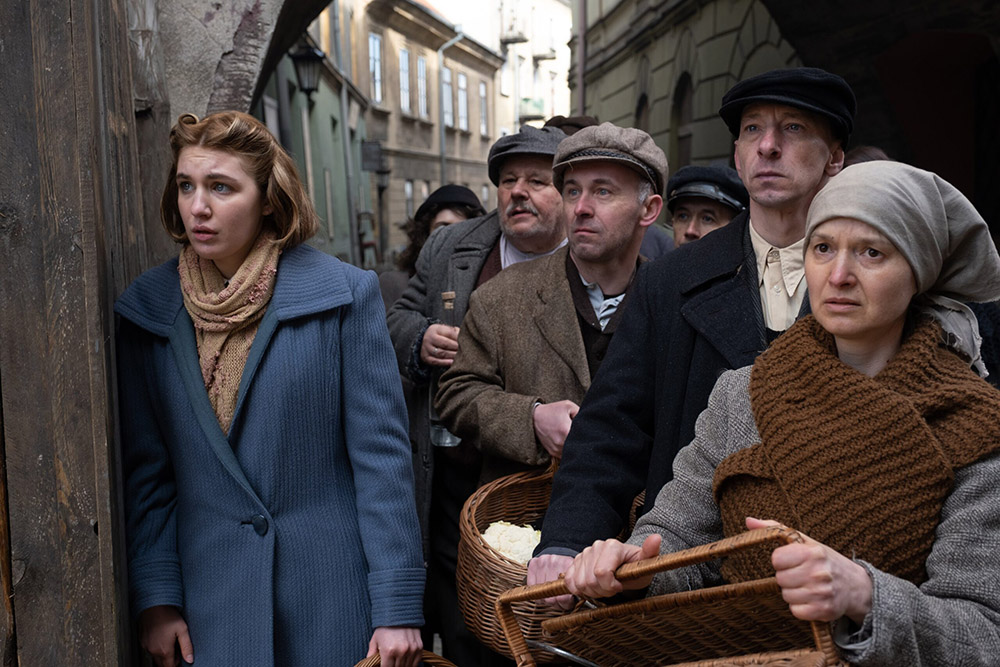
Sophie Nélisse, left, as Irena Gut in a scene from the movie "Irena's Vow" (Courtesy of Quiver Distribution)
Louise Archambault's new film, "Irena's Vow," tells the true story of Irena Gut, the young Polish housekeeper for Nazi Major Eduard Rügemer during World War II. Guided by her Catholic faith, Gut risked her life by hiding 12 Jews in Rügemer's basement without his knowledge. NCR had the chance to speak with the film's star, Sophie Nélisse ("Yellowjackets," "The Book Thief"), and Irena Gut's daughter, Jeannie Smith.
Smith's eyes welled with tears as she described how her mother's legacy has extended well beyond her death in 2003 at 85 years old.
"She has just become bigger and bigger in my life every week," she told NCR. "I wish I had had as much admiration for her as I do now, that's my one regret actually. You just don't know what you have until it's gone."
That same maternal thread that Smith feels with her mother, even after her death, is sewn thoughtfully throughout the film. While Gut never set out to be a savior, the trajectory of her life was forever changed after she witnessed a Nazi brutally beat a Jewish infant and smash the child into the ground, before killing the baby's hysterical mother.
(While the rest of the film isn't particularly violent, this scene — though not explicitly graphic — earns the film its R rating due to the deeply disturbing nature of the crime.)
Witnessing infanticide changed something inside of Gut, and she vowed to never again be forced to sit and watch helplessly as innocent life is taken. So when presented with the opportunity to provide refuge for a dozen men and women, she did so without hesitation, despite the massive personal risk.
Advertisement
Perhaps the most moving part of the film is when one of the couples sheltered by Gut asks for her help in getting supplies to perform an abortion in their basement hideout. While the couple admits that they would want the baby under any other circumstances, they feel that delivering and harboring a child in hiding would just be too risky not only for themselves, but for their fellow refugees.
Gut refuses. The men and women plead with her, asking her to put aside her Catholic faith and its teachings about abortion, but she insists that her faith isn't what's stopping her from performing the abortion; rather, it's the promise she made to herself that she would never again allow innocent life to be taken in front of her, whether out of hate or convenience.
The film speaks to the unique power of a woman's witness — especially in times of war, violence and despair. "Irena's Vow" brings to mind the life and legacy of Edith Stein, a German Jew who converted to Catholicism and lived her life as a Carmelite before being martyred in a gas chamber by the Nazis in 1942. In 1998, she was canonized by Pope John Paul II under the new name of St. Teresa Benedicta of the Cross, after being credited with the miraculous healing of a child in Boston.
St. Teresa, like Irena Gut, didn't have many earthly possessions or advantages to speak of, and yet they still managed to save innocent young lives in both life and death. Both women were poor, oppressed, arrested and imprisoned during a period of unimaginable violence and darkness. And yet they gave the world what they were: maternal, courageous, generous, prayerful and unyielding. Their legacies live on in women like Gut's daughter, Jeannie Smith, who surely makes her mother proud through her involvement in this film — and beyond.







